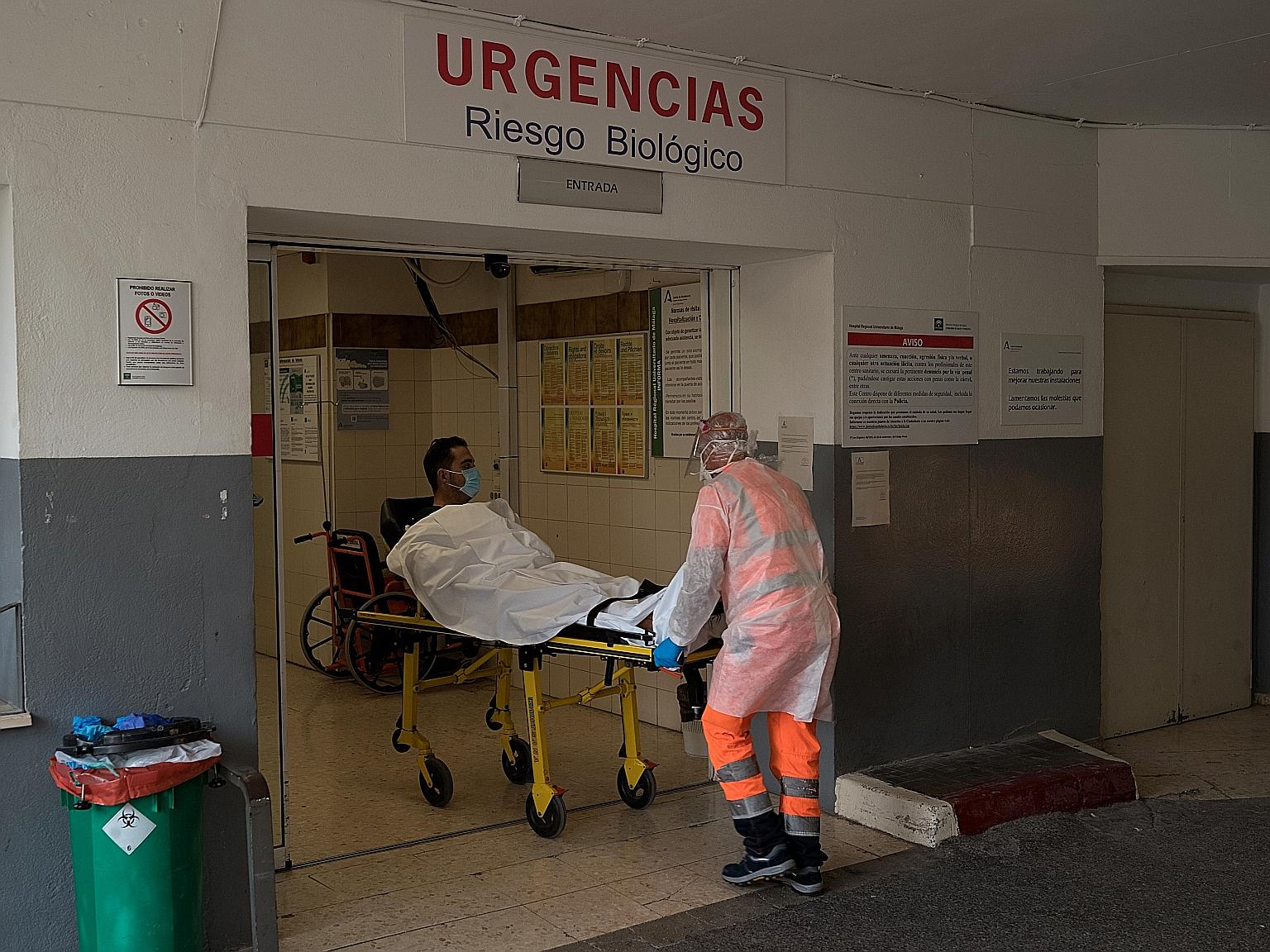Second coronavirus wave grips Spain as cases mount
Rapid return of nightlife, gatherings among reasons for surge; health experts say country better able to cope now
Sign up now: Get ST's newsletters delivered to your inbox

A suspected Covid-19 patient being wheeled into the emergency room of a hospital in Malaga, Spain, on Sunday.
PHOTO: NYTIMES
MALAGA (Spain) • At midday on Sunday, there were 31 patients inside the main coronavirus treatment centre in Malaga, the city with the fastest-rising infection rate in southern Spain. At 12.15pm, the 32nd arrived in an ambulance. Half an hour later came number 33.
The rubbish bin by the door overflowed with masks and blue surgical gloves. Relatives hovered in silence outside the centre - one of them in tears, another feeling a pang of deja-vu.
"My brother-in-law had the virus in the spring," said Ms Julia Bautista, a 58-year-old retired office administrator waiting for news of her 91-year-old father.
"Here we go again," she added.
If Italy was the harbinger of the first wave of Europe's coronavirus pandemic in February, Spain is the portent of its second.
France is also seeing a surge in cases, as are parts of Eastern Europe, and cases are ticking up in Germany, Greece, Italy and Belgium, too, but in the past week, Spain has recorded the most number of new cases on the continent by far - more than 53,000.
With 114 new infections per 100,000 people in that time, the virus is spreading faster in Spain than in the United States, more than twice as fast as in France, about eight times the rate in Italy and Britain, and 10 times the pace in Germany.
Spain was already one of the hardest-hit countries in Europe, and now has about 440,000 cases and more than 29,000 deaths. But after one of the world's most stringent lockdowns, which did check the virus' spread, it then enjoyed one of the most rapid reopenings. The return of nightlife and group activities - far faster than most of its European neighbours - has contributed to the epidemic's resurgence.
Now, as other Europeans mull over how to restart their economies while still protecting human life, the Spanish have become an early bellwether for how a second wave might happen, how hard it might hit, and how it could be contained.
"Perhaps Spain is the canary in the coal mine," said Professor Antoni Trilla, an epidemiologist at the Barcelona Institute for Global Health, a research group. "Many countries may follow us - but hopefully not at the same speed or with the same number of cases that we are facing."
Explanations for the surge include large family gatherings, the return of tourism in cities like Malaga, the decision to return responsibility for fighting the virus to regional authorities at the end of the nationwide lockdown, a lack of adequate housing and healthcare for migrants and the revival of nightlife.
To be sure, doctors and politicians are not as terrified by Spain's second wave as they were by its first. The mortality rate is roughly half the rate at the height of the crisis - falling to 6.6 per cent from the 12 per cent peak in May.
The median age of sufferers has fallen to around 37 from 60. Asymptomatic cases account for more than 50 per cent of positive results, which is partly due to a fourfold rise in testing. And the health institutions feel much better prepared.
"We have experience now," said Dr Maria del Mar Vazquez, the medical director of the hospital in Malaga where Ms Bautista's father was being treated.
"We have a much bigger stock of equipment, we have protocols in place, we are more prepared," Dr Vazquez said. "The hospitals will be full - but we are ready."
National coordination has also improved while testing speeds are accelerating - in Malaga, the biggest hospital can process tests within a single morning, thanks to the recent purchase of a series of robots.
"It's not like the first wave," said Ms Carmen Cerezo, 38, a train attendant waiting outside the Malaga hospital while her father was tested for coronavirus inside.
"We're calmer now," she said.
NYTIMES


